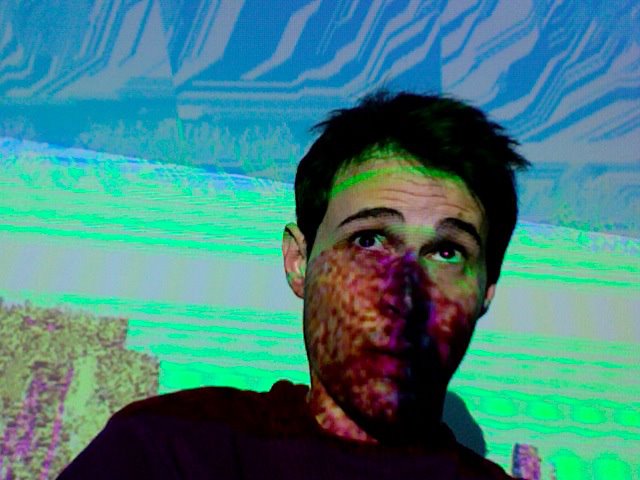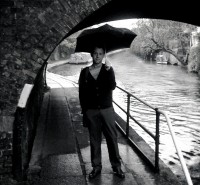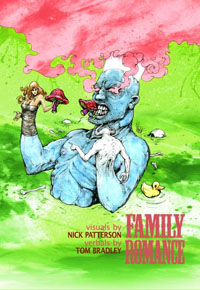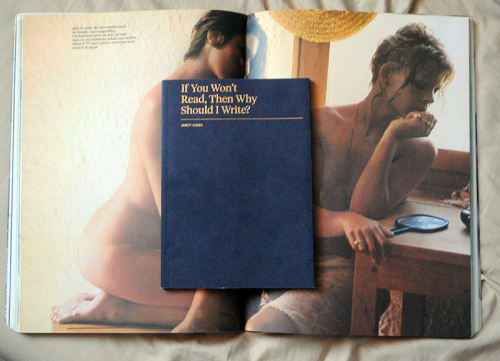Leaving Hawaii: An Interview with Heiko Julién

OK, interview. (interview is beginning)
(swallows gum)
I am listening to Riff Raff “Rice Out” on repeat, for context.
I am currently broke.
(Irony)
Cool. I am wearing my brothers t-shirt and shorts and am on his computer at my parents’ house.
Nice.
He has soccer shorts but he doesn’t play soccer. He just likes to watch the players I guess.
What topics are on the table. Your ebook. Can we talk about Hawaii?
Wonder if he calls it Football. Not sure how authentic he is… Yes indeed we can [talk about Hawaii].
Sweet.
I have a lot to say about Hawaii.
Please talk about, Hawaii… READ MORE >
Hanging Out vs. Being Hanged: An Interview with Jarett Kobek
Jarett Kobek is the author of ATTA, from Semiotext(e), and the forthcoming If You Won’t Read, Then Why Should I Write? on Penny-Ante Editions.
If You Won’t Read…, often referred to by Kobek as “The Sex Tapes Book,” is a collection of the coincidental dialog from celebrity sex tapes (and some other hyper-media-based ‘tapes’) transcribed and presented as a text. Included alongside these transcriptions is the criminal records of the celebrity whose dialog is on display. Riding a fine line between conceptual writing, humor, gossip, and ‘alt-lit,’ the book ends up being hilariously funny while resonating with an intense cultural relevance.
I sat down with Jarett one afternoon at a café in San Francisco’s Mission District to talk about his new book. The hour-long conversation, covering everything from Normal Mailer to Jennifer Lopez to Miley Cyrus’s shamanic trip, is available to listen to below:
Interview with Jarett Kobek, Part 1
Interview with Jarett Kobek, Part 2
Pre-order If You Won’t Read, Then Why Should I Write? at Penny-Ante Editions.
Literature, Materialism, and the Present Conjuncture: an Interview with David Winters
 Literary critic David Winters, co-editor of 3:AM Magazine, has steadily developed a style and practice of review that can only be called materialist. Rather than “evaluate” a book, Winters qualifies its relationship to the broken and stultifying world from which it originates–not as an outright transcendence of that world, but as a moment, an effect, of its awful machinery, the gore and rancor of a history that has in many ways forgotten to bear a future. The book as such does not seek to solve the problems of the anima mundi but instead to put them on stage and in motion. So the work of literature, David argues, would not be the archangel of the everyday, but would try to give shape to its devastation, to the series of social splits and divisions whose conjunction make the novel possible, if not, David suggests, also threaten it with obsolescence. By focusing on this element of the book–its immortality and undead texture, its position as both a social given and a reflection of such givens–David has aligned materialist aims with a new form of criticism: a reading of the work as a weapon and not simply a code, and moreover, a weapon that can be trained on both itself and the present in which it is embedded. The following is an extended interview with him. Enjoy.
Literary critic David Winters, co-editor of 3:AM Magazine, has steadily developed a style and practice of review that can only be called materialist. Rather than “evaluate” a book, Winters qualifies its relationship to the broken and stultifying world from which it originates–not as an outright transcendence of that world, but as a moment, an effect, of its awful machinery, the gore and rancor of a history that has in many ways forgotten to bear a future. The book as such does not seek to solve the problems of the anima mundi but instead to put them on stage and in motion. So the work of literature, David argues, would not be the archangel of the everyday, but would try to give shape to its devastation, to the series of social splits and divisions whose conjunction make the novel possible, if not, David suggests, also threaten it with obsolescence. By focusing on this element of the book–its immortality and undead texture, its position as both a social given and a reflection of such givens–David has aligned materialist aims with a new form of criticism: a reading of the work as a weapon and not simply a code, and moreover, a weapon that can be trained on both itself and the present in which it is embedded. The following is an extended interview with him. Enjoy.
*
my body ain’t your battleground: Lidia Yuknavitch’s DORA
To promote her new book DORA, Lidia Yuknavitch has this campaign going on her FB page.
You can buy the book here.
McDonald’s, Target, Dicks: an interview with Shane Jones
 Everything’s coming up Shane Jones. His new book, Daniel Fights a Hurricane, releases today from Penguin (check out Ellen Frances’s sweet trailer here), which means Shane is back in full swing on the internet. Awesome—it’s good to read his mind like this, enjoy his wit and ingenuity. Here is an homage to Faulkner at Tin House. At The Millions, an essay about why he writes. PLUS, Albany crowned him the best writer in all the city, so you know, he’s got that going for him, which is nice. I just got my new copy of NYLON, and they’ve reviewed the book; Jess Sauer calls it “a modern fable, and despite its apocalyptic overtones, Daniel’s delusions are more beautiful than grim.”
Everything’s coming up Shane Jones. His new book, Daniel Fights a Hurricane, releases today from Penguin (check out Ellen Frances’s sweet trailer here), which means Shane is back in full swing on the internet. Awesome—it’s good to read his mind like this, enjoy his wit and ingenuity. Here is an homage to Faulkner at Tin House. At The Millions, an essay about why he writes. PLUS, Albany crowned him the best writer in all the city, so you know, he’s got that going for him, which is nice. I just got my new copy of NYLON, and they’ve reviewed the book; Jess Sauer calls it “a modern fable, and despite its apocalyptic overtones, Daniel’s delusions are more beautiful than grim.”
The most striking feature of the novel for me is how palpable the levels of reality are. Shane juggles all these layers of occurrence and perception in an unsettling way, but what makes him so good at it is 1) how funny he is, and 2) how effectively he times the switches, brings in the actuality, gives hints about what’s what. The book is like a snowflake: no two readings will ever be alike.
How do you like being Best Writer in Albany?
The local arts paper here does that every year – a best of thing. I think local businesses really try and get like “Best Place for Dinner” because it translates into people eating at their place. But Best Writer? Meh. I don’t know if anyone really cares. I joked to a friend of mine that I was going on a “best of” tour in Albany but he didn’t think it was too funny. It’s tough being the best.
So, what’s Daniel’s problem?
That’s a good question. I don’t know. He fits into the world and he also doesn’t fit into the world. My biggest fear is that people will read his character as just “some insane guy” and won’t see any of the beauty, sadness, depth, of his character and world. Daniel’s biggest problem will probably be certain readers.
So—Daniel Fights a Hurricane—weird book, huh? I think once again you’ve created something that does things with story that people don’t expect. How do you describe it to smart people who maybe don’t read a lot?
I’ve said before how hard it is to describe my own book. Do you have this problem? You’re really handsome, so people probably just buy your book immediately. I have a fantasy where I just scream into someone’s face “JUST READ THE FUCKING BOOK!” and they’re like, “Oh wow, yeah, I’ll go and read it right now.” I guess it is a weird book? It mixes reality and imagination and overlaps them and weaves them together and stuff like that. It’s like mixing a bunch of colors of paint in one can and seeing what’s going to happen. READ MORE >
Seismic Impacts, or Miniscule Ones: an interview with Dan Magers
 Partyknife, by Dan Magers, was published by Birds, LLC in June. It’s an irresistible collection of poetry, remarkably NOW—remarkably of the moment—while also markedly aware of what poetry is and has been and will be.
Partyknife, by Dan Magers, was published by Birds, LLC in June. It’s an irresistible collection of poetry, remarkably NOW—remarkably of the moment—while also markedly aware of what poetry is and has been and will be.
The book is set up like a record, with a Side A and Side B. It’s even shaped and designed like a 7″. While the 70 poems inside are mostly short, they read continuously, cohesively, with a seamless logic to them. Magers’ subjects are the sort of things you’d find in the room of the coolest guy in your dorm: like, you know, metal bands and video games and pot and amps and a sexy grime.
Here’s how Blake described it at Vice, which nails it:
at first it seems you’re being spoken to in party conversation talk, then it seems maybe like you’re on Twitter, then suddenly you’re digging through one of Wittgenstein’s notebooks, then you’re reading a letter from someone you used to know.
In that way, it’s a very familiar and welcoming book. So Dan’s a good guy to talk about poetry’s situation, which we do in the following interview.
FAMILY ROMANCE: word and image converge seamlessly like a love sarong with no zipper
 Family Romance
Family Romance
by Tom Bradley
Visuals by Nick Patterson
Jaded Ibis Press, Fall 2012
CYE JOHAN interviews TOM BRADLEY:
CJ: How did Family Romance get made?
TB: In just the opposite way from most illustrated novels. Nick Patterson’s ninety pictures came first, and I wrote the novel around, between, underneath and through them. One day I came upon a great stack of his artwork, and was instantaneously locked in. Each image presented a climactic moment in a strange, unspoken, yet definite story.
Nick’s drawings and paintings are like the hallucinations of epileptic mystics as preserved in icons and illuminated hagiographies. They rear up in the aether before your eyes, bristling their spikes of light, needing no context but themselves. Yet they insist that a whole chronicle be imaginatively filled in, to perform the impossible task of explaining how these bizarreries came to be juxtaposed.
CJ: One of Nick Patterson’s online fans asked him how he came up with his stuff, and he replied, “I pay attention to random thoughts.”
TB: A perfect motto for him. That single sentence gives a vivid glimpse into the head of such a visual artist. We all have dreams and daydreams that are so utterly without rational context that they vanish before we can recall anything but the most general outlines. Even those dissolve within seconds. Nick not only remembers all, but he draws it in meticulous detail. He gives a perfect anatomical rendering of something that never had anatomy in the first place, at least not on this plane of forms.
Talking with Shane Anderson

Berlin-based Broken Dimanche Press has recently published Shane Anderson’s debut, Études des Gottnarrenmaschinen, which is a beautiful book object, and described thusly:
It’s not often that a collection of writing reaches as far and wide as Shane Anderson’s debut work, Études des Gottnarrenmaschinen…[a] bold collection which includes three works that explore the boundaries of fiction and poetry. Utilizing a plethora of devices – erasures, pseudo application forms, Oulipo constraints, and the limits of the paragraph – this is indeed a virtuoso collection that takes on the problems of (modern) travel, power relations, historical and mental representation.
To help celebrate the publication, Anderson and I discussed the book and many other things related to it.
Soros And The European Poetry Crisis

Billionaire hedge fund manager and democracy advocate George Soros recently received the social media equivalent of a standing ovation from the world of finance. Instead of remaining in charts and data, or even in their value synthesis re: analyzing Europ’s sovereign debt crisis, he did what few money men had (and none in his position) done: he effectively used a metaphor. It was the kind of poetry that moves markets.
“Bubble” is a common enough term in popular finance, but it lacks a quantitative definition. It’s an existential state, or a spiritual one: a bloating, a swelling of the imagination glands (Dickensian?), a cultural feast that becomes a fiscal implosion. We fondly remember the Tech Bubble. We feel the presence of ghosts and of animated furniture (Marx?). Here’s what Soros wrote about on his personal blog (yes – indeed dear readers) . To be completely fair, he was reblogging his speech from the Festival of Economics in Trento Italy – but this is what “went viral”:


